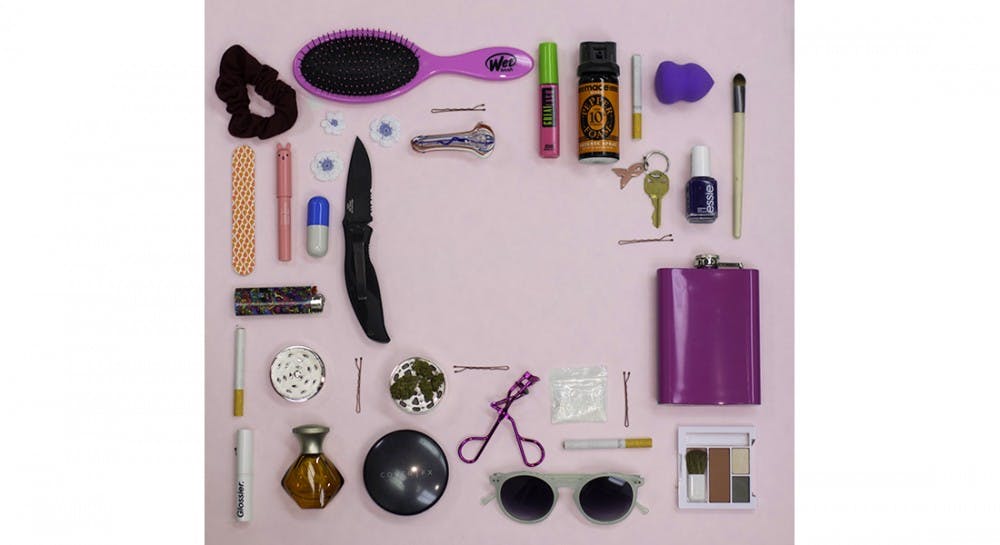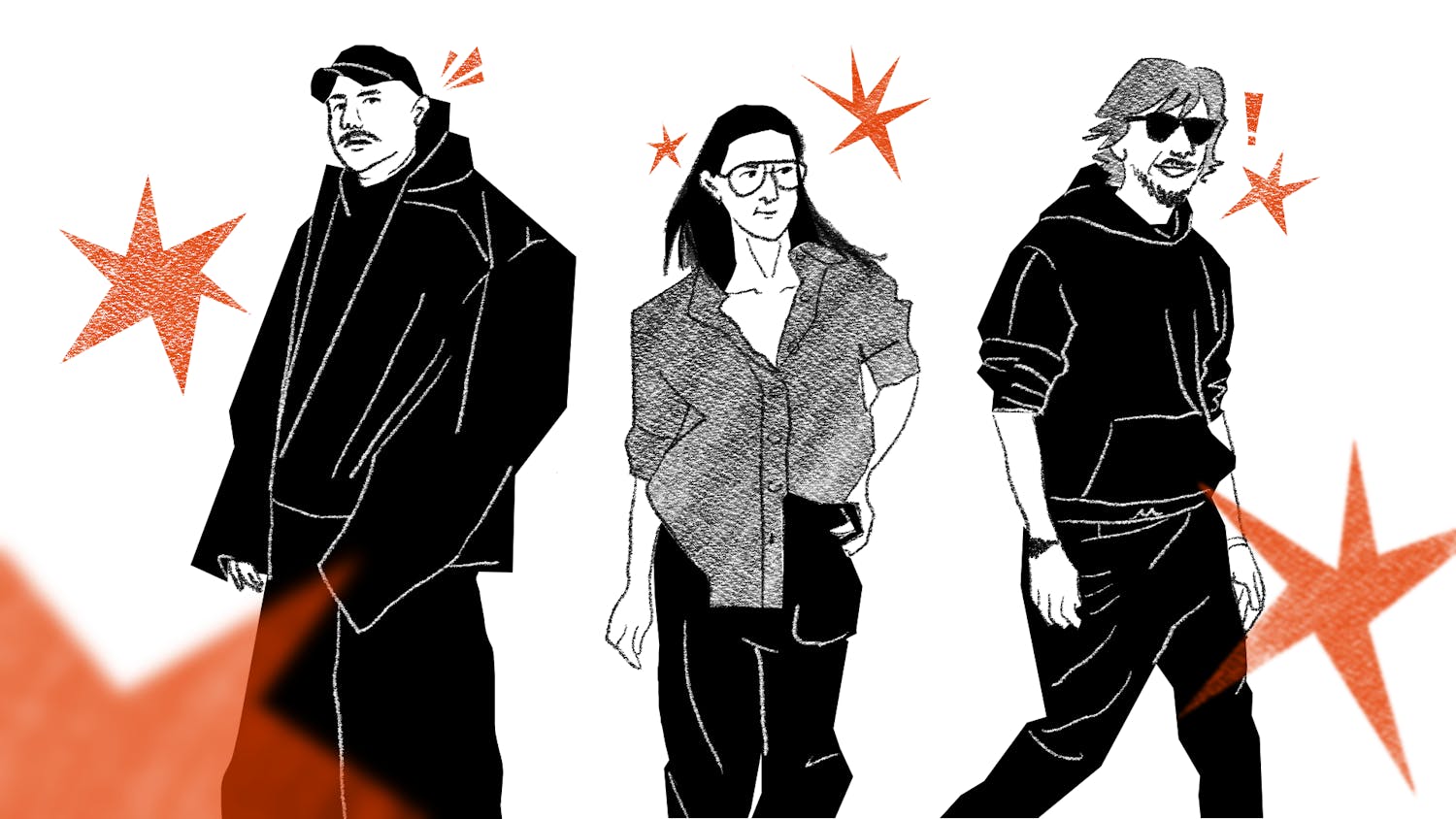Beth* wakes up at 6:30 a.m. every weekday morning. She showers, dresses, then shimmies open her wooden nightstand. It’s her “drug drawer,” she laughs, where she stashes her supply. She shakes a gram of chalky powder onto the scale, then pours it into a plastic earring bag. The drug—coke, ketamine, anything besides weed (it smells too strong) — stays tucked in the pouch of her backpack, while Beth heads to Saxbys and lecture halls and crunches Locust beneath her boots.
“I almost literally always have stuff on me,” she says.
She’s adamant about delivering to her clients; she doesn’t want them to know where she lives. It’s a safety precaution. Beth has carried drugs to Huntsman, to an off–campus frat house. She’s handed off baggies of coke in Smokes’, then left to go about her night.
Beth shakes as she talks, wriggling in an iron chair outside Metropolitan Bakery. But when the conversation turns to empowerment, she adjusts her sunglasses and giggles: “I’m breaking the glass ceiling in my own way.”
Estimating the scope of Penn’s drug world is tough. But identifying the gender breakdown is easy: drug–dealing is male–dominated. Campus dealers and users grasp at the reason for this. “The frats?” Beth guesses. “The danger?” shrugs a girl at a party, before taking a hit and exhaling curls of fog.
Female dealers face a unique set of challenges. The “industry” (many of the dealers interviewed for this piece snickered at the term) is a bubble, and it has its own language: texts and winks and furtive exchanges, the scrunch of plastic bags in sweating fists. And so the stories and struggles of women who sell drugs are also hidden, tucked beneath the surface of a campus that pulses and puffs.
Google “drug dealer.” The search garners pages and pages of men: in beanies and hoodies, huddling behind fences, fanning themselves with hundred dollar bills. It takes hundreds of images for a female face to appear. The first result is a dirt–smeared woman, hair crinkled with grease. Penn’s female dealers look different. They operate in plain sight, liberated because nobody suspects them.
Beth has been using drugs since she was 14, but she’s never had a female dealer.
She buys her supplies in bulk during class. She hops onto the dark web and purchases molly, acid, shrooms. It takes her a solid two minutes to describe the steps she takes to disguise her online presence: the VPN, the encryptions, the transaction over Bitcoin. Most drugs arrive at her off–campus apartment, bundled in packaging (although over the summer, she sent them to the security guard at her internship office). The drugs are disguised as jewelery or junk mail. Once, a shipment came in an envelope with a generic energy company stamped on it, a flattened bag of cocaine tucked into a carved–out square. “When I got it, I just started laughing,” she says. Like Beth, they slide easily under the radar, unnoticed.
“I love smoking weed,” coos Marissa* over the phone. “I definitely think of smoking weed as a guy’s kind of thing.”
Marissa’s familiar with several fraternities on campus. When she thinks of their chapter houses, she pictures people “sitting around in their rooms smoking.”
“Which is not saying me and my girl roommates don’t also do that,” she says, “but I think it’s more rare for a house of girls to just be sitting around ripping the bong.”
Marissa thinks the major source of this divide stems from frat houses: dingier “more drug–conducive” environments, with fewer restrictions from national organizations and no oversight from a Panhellenic council that won’t even allow alcohol in sorority houses. It has to do with “politeness,” she thinks, or maybe “girls are just more motivated.” She laughs. “I don’t know, man.”
When Marissa started buying and dealing drugs at Penn, she wasn’t sure how to go about it. She texted an ex–boyfriend asking how to purchase weed. “I don’t know the demeanor,” she says. “Because the other people I know who are doing this are all guys.”
Marissa sells her extra Adderall. Her business is low–profit: a few friends, a flutter of texts, a palm of blue pills for the occasional $20. But she finds it empowering to deal. Marissa giggles. “I kinda felt like I was being a tough guy.”
Beth gets high most nights. After finishing up her homework, she curls up with a group of friends to take puffs out of a pink glass bubbler. On weekends she scrapes coke into trim lines on bathroom sinks, on the mirrors in frat laundry rooms. She’s sold molly, acid, shrooms, ketamine, Xanax. Beth knows drugs.
“But if you’re a girl and you tell someone you smoke or something,” she says, “they’re like, ‘That’s weird, you’re a stoner?’”
Beth has ten regular customers; all of them are male. Sometimes they question her knowledge of the drugs she sells: Did you weigh it? They’ll ask her. She keeps a steel pocket scale on her desk. Oh, do you do this a lot? A boy will say while she slips him a plastic bag of coke in Huntsman. Beth orders a new shipment every other week.
“People assume I’m an idiot about this stuff,” she says. “I pay a lot of attention to not getting fucked over.” She sighs. “People assume that it’s easy to fuck me over.”
Texts from fraternity brothers sputtered onto Lily’s* phone: What do you mean, you can’t be available?
I know your name.
I know where you live.
I could ruin your whole business.
Lily had sold to them before. They had an arrangement: the frat would pick up Ziplocs of weed from her Harnwell apartment and Venmo her afterwards. They later stole an ounce from her, grabbing $240 worth of marijuana without paying her back.
Today, Lily lives in a house 15 minutes from campus, with walls stuccoed with glittering duct–taped stickers and the palpable smell of pot. One of her female roommates sells Xanax. She’s also had trouble with members of the same fraternity: threatening texts, accusations, demands for refunds of pills she’d warned weren’t as strong as the last batch.
Lily answers the door for her clients in PJs, in between physics problems. She deals to a predominantly male clientele (75%, she estimates), mostly to save up for med school. She’ll have the Ziploc bag stuffed and ready for them, or she’ll lead them up the grime–kissed wooden stairs to her room where a bong sits on the table, a bright pink lighter next to coarse buds of pot. She shovels a Solo cup into a bag of weed and weighs the amount on a scale. The customer’s out within a matter of minutes.
They feel comfortable with her, she says. She credits some of that to her gender. “I’m not the threatening asshole type,” she says, cradling a plastic jug of macadamia nuts.
She gets her stash from a few different sources. There was the grower in California who tried to take her out for drinks when she visited him a year ago (she declined; “I think it’s weird to involve sex into a kinda business relationship”). There’s the supplier in Philadelphia who calls her “babe” and makes “that’s what she said” jokes, even when Lily makes a point to talk about his girlfriend.
Lily flops across her bed, stomach to the ceiling, flicking the edge of her striped sock against her ankle. “Freshman and sophomore year, I felt that there was some shit happening just because I’m a girl,” she says. “Customers would come up to me and be dicks, and the way they talked to me and stuff—I don’t know if they would ever talk to their drug dealer like this if it was a guy.”
“Women are more risk averse,” Beth types over text. It’s two weeks since our interview, and we’re still stuck on the question: why do women deal less frequently than men? “I think that I picture the stereotypical male as having more hubris than me but idk if that’s true,” she writes.
“My guy at home literally drives through the streets hotboxing his car and dealing,” she adds. “But he just might be an idiot.”
Beth has heard girls at Penn claim they don’t need to buy their own drugs. “They’re like, ‘Boys give them to me for free,’” she says, waving her hands. “I’m like, okay, great, but you gotta be self–sufficient.”
Kate*, who would only agree to an interview over text, sells weed out of her on–campus dorm room. She thinks the reason why there aren’t many female drug dealers is the same reason why there aren’t as many female construction workers or miners: because “the nature of it is perceived as rather brute or cruel and is traditionally male–dominated.”
But there’s also the element of reputation: what men can “get away with,” she says, “and still have friends.”
“Guys have always gotten away with being sketchy,” she types. “In that sense, it’s sexist as fuck.”
*Indicates name has been changed.







